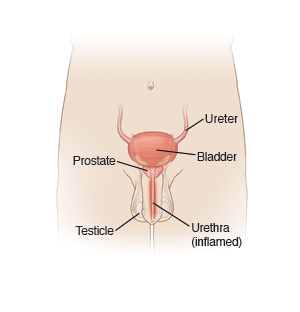You have urethritis. This is swelling (inflammation) in the urethra. The urethra is the tube between the bladder and the tip of the penis. Urine drains out of the body through the urethra. Urethritis has both infectious and noninfectious causes. It is most often caused by gonorrhea, chlamydia, or both. The cause of your infection is gonorrhea. This is a sexually transmitted infection (STI).
Women often don't have symptoms at the start of an infection. But men often do. Symptoms often start within 1 week after infection. But they can take up to a month. Symptoms can include:
-
Burning or pain when urinating
-
Irritation in the penis
-
Pus discharge from the penis
-
Pain and possible swelling in one or both testicles
When the infection is also in other areas, it can cause:
-
Rectal pain and discharge
-
Throat infections
-
Eye infections (conjunctivitis)
If not treated, your infection can get worse. It can spread to other parts of your body. It can also cause rashes, arthritis, and infections in your joints, heart, and brain.
Gonorrhea needs to be treated with antibiotics. This is important, so it does not get worse and spread. It is contagious. You need treatment so you don't give it to someone else. If you give it to a woman, it can cause pelvic inflammatory disease (PID) and infertility.
People can have gonorrhea without symptoms. So your sexual partners also need to be treated, even if they have no symptoms. If they are not treated, and you keep having sex with them, you will be infected again. Your sexual partners should contact their own healthcare providers or go to an urgent care clinic or the public health department to be checked and treated.
Home care
These guidelines can help you care for yourself at home:
-
Take all of the antibiotics you were given until they are used up. Finish the antibiotics, even if your symptoms are gone. This is to make sure the infection has cleared.
-
Don't have sex until both you and your partners have finished all the antibiotics, and your healthcare provider says you are no longer contagious.
-
You can take over-the-counter medicine for pain, unless you were given a different pain medicine. If you have long-term (chronic) liver or kidney disease or ever had a stomach ulcer or GI (gastrointestinal) bleeding, or are taking blood-thinner medicines, talk with your healthcare provider before using these medicines.
-
Don’t take aspirin or medicine that contains aspirin if you are younger than age 19 unless directed by your provider. Taking aspirin can put someone that age at risk for Reye syndrome. This is a rare but very serious disorder. It most often affects the brain and the liver.
-
Learn about and use safe sex practices. The safest sex is with a partner who has tested negative and only has sex with you. Condoms may stop some STIs from spreading. These include gonorrhea, chlamydia, and HIV. But they are not a guarantee.
Follow-up care
Follow up with your healthcare provider, or as advised. If a culture test was taken, you may call for the results as advised. Another culture test should be done 4 to 6 weeks after treatment to be sure the infection is gone. Follow up with your provider or the public health department for a complete STI screening, including HIV testing. For more information about STIs, contact the CDC at 800-232-4636.
When to get medical advice
Call your healthcare provider right away if any of these occur:
-
No improvement after 3 days of treatment
-
Unable to urinate
-
Rash or joint pain
-
Painful sores on the penis
-
Enlarged painful lumps (lymph nodes) in the groin
-
Testicle pain or swollen scrotum
Featured in


